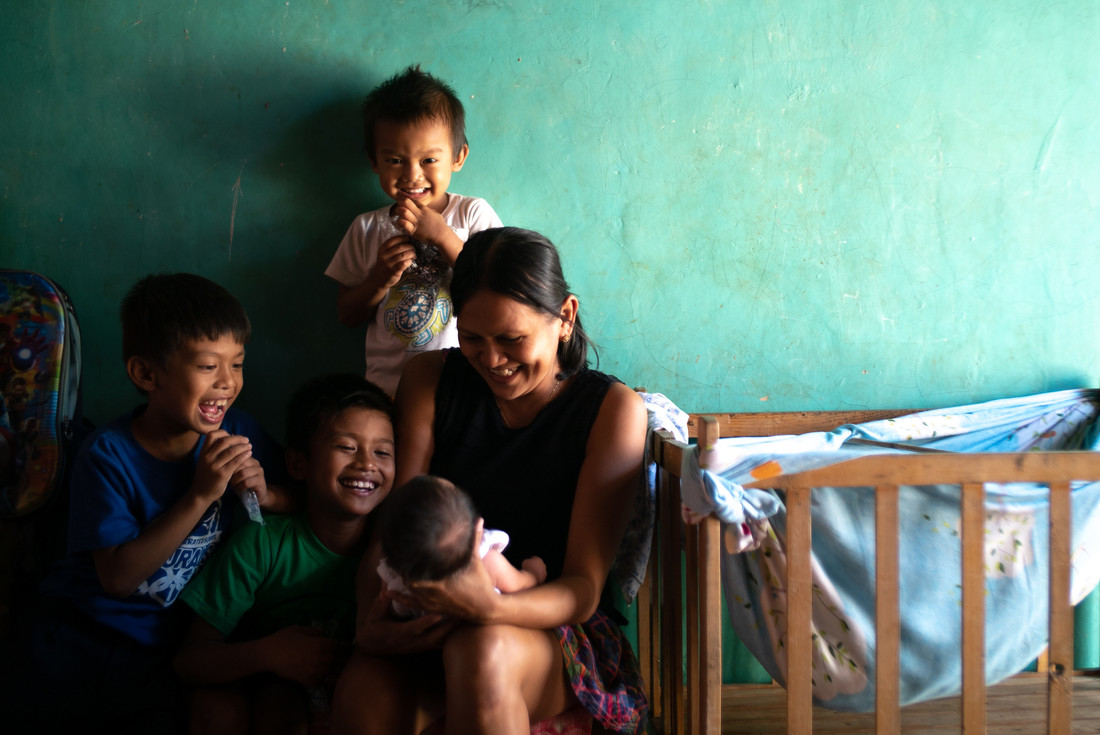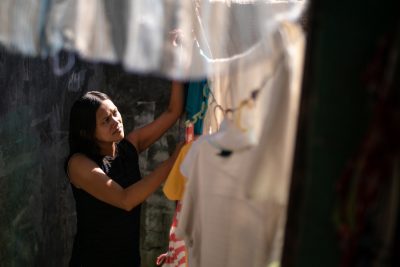
By Ann Marie Foley - 22 January, 2020

Ruth is a mother of seven in the Philippines.
Ireland has 17 billionaires, which means our nation has the fifth largest number of super-rich per capita in the world. This is according to Oxfam’s newest report on inequality published ahead of the World Economic Forum in Davos, Switzerland.
Ireland ranks fifth in the world after Hong Kong, Cyprus, Switzerland and Singapore, and has one of the highest levels of wealth inequality in the EU, according to Oxfam.
The report looks at governments’ role in fueling the inequality crisis by under-taxing the wealthiest individuals and corporations. It highlights in particular how what it calls a “sexist global economy” affects women and girls most. For example, women’s unpaid care work is worth three times the value of the global tech sector.
“Ireland is set to address the crucial issue of care, carers and those who receive care in the upcoming Citizen’s Assembly on gender inequality – an important moment to meaningfully engage – and resource – solutions to the disproportionate impact unpaid care work has on Irish women,” stated Jim Clarken, chief executive, Oxfam Ireland. “We’re calling for changes to social and employment policies that support carers, enabling them to combine caring with employment and encouraging more men to participate in care work,” he said.
He added that there should be more paid shared parental leave or a reformed pension system that means women do not miss out if they have to leave the workforce to care for a loved one.
“We need high-quality care services, resourced by care workers that are paid a living wage,” he said.
In Ireland, the report states, women carry out 38 million hours of unpaid care work every week, contributing at least €24 billion to the economy every year – the equivalent of 12.3 per cent of the entire annual Irish economy
The report, which is titled ‘Time to Care’, highlights global inequality, with the world’s 2,153 billionaires owning more wealth than the 4.6 billion people who make up 60 per cent of the planet’s population. Extreme inequality is trapping millions of people in poverty around the world. Even if estimates of the wealth of the world’s poorest have been revised upwards this year, half the world’s population continues to live on less than €5 a day ($5.50).
Globally, women do more than three-quarters of all unpaid care work. Women and girls are putting in 12.5 billion hours of unpaid care work every day, such as looking after children and the elderly, which amounts to a contribution to the global economy of at least $10.8 trillion a year.
Max Lawson, head of inequality policy, Oxfam International spoke to Vatican News about the report, stating that there is currently a “billionaire boom phenomenon” that the world would be better off without.
He said that billionaires are “the sign of a sick and broken economy and the world”, and added “the world would be a lot better if you could take all of that money that is concentrated in the secret Swiss bank accounts of the richest people, and distribute it widely across the world: just imagine what we could do with that money – schools, hospitals, teachers, nurses…”
 He said he hopes that Oxfam’s message will reach the ears of those at the World Economic Forum in Davos. The charity is part of an alliance that has a voice at the Forum.
He said he hopes that Oxfam’s message will reach the ears of those at the World Economic Forum in Davos. The charity is part of an alliance that has a voice at the Forum.
He added that the solutions for inequality will come from ordinary people and stated: “The solution to the inequality crisis across the world will not come from Davos and will never come from billionaires. The solutions will come from ordinary people forcing politicians to listen to them.”
Oxfam is urging governments to create fairer fiscal systems and crack down on tax loopholes to raise the revenue needed to invest in national care systems and public services that meet everyone’s needs, without relying on unpaid and underpaid work by women.
Getting the richest 1 per cent to pay just 0.5 per cent extra tax on their wealth over the next ten years could raise enough money to create 117 million jobs, including 79 million in education, health and social care which would help close the current care gap, the charity stated.